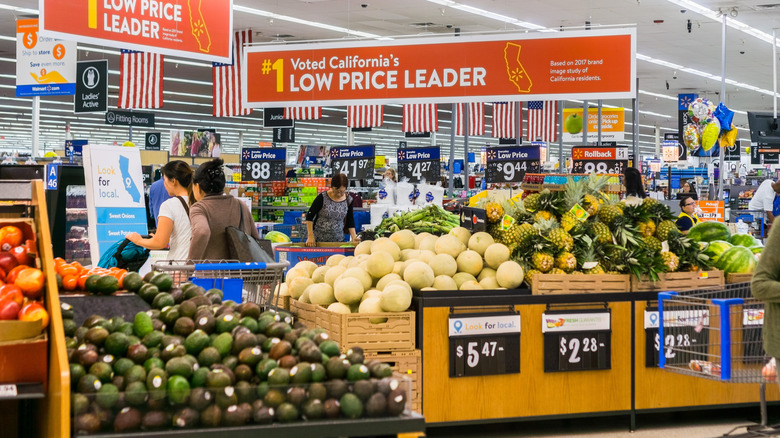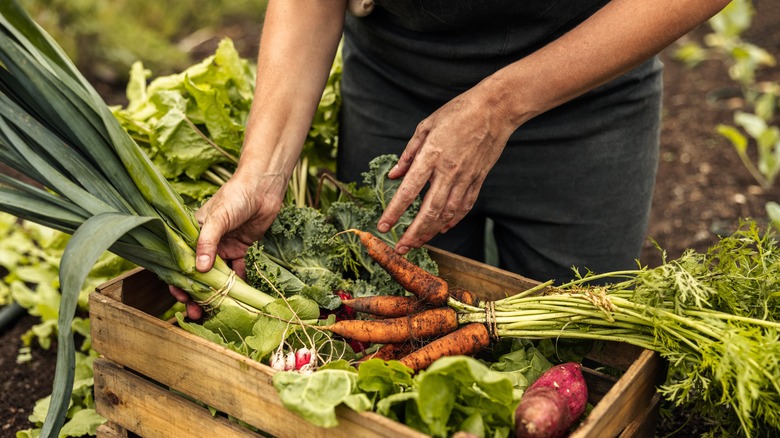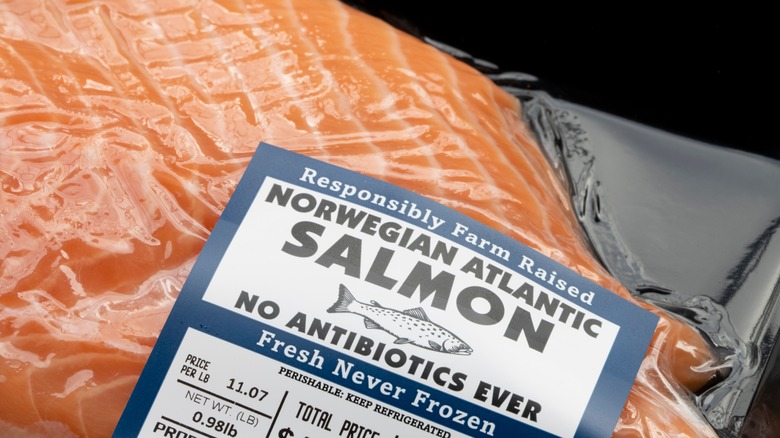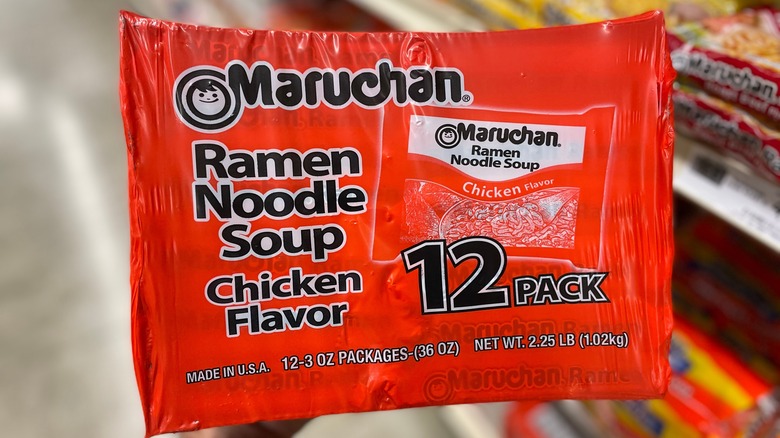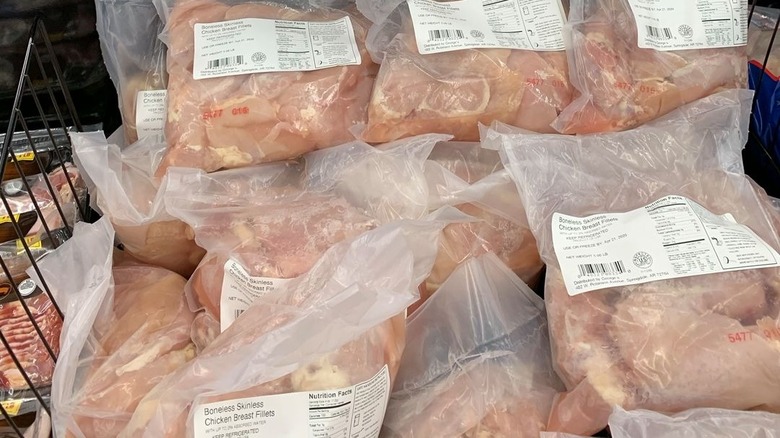12 Foods You Might Want To Avoid Buying At Walmart
Walmart is far and away the most popular store in the world, and one of the most successful businesses on the planet — and for good reason. The retail giant is known for selling a little bit of everything at some of the best prices that you'll find. However, the store isn't perfect, and there are certain food purchases that you will want to make elsewhere.
This is due to several reasons. Some of the options for these food items are healthier in other places, while others are more expensive. For some other items, Walmart has a reputation for poor quality. Recognizing which items you should avoid purchasing at Walmart enables you to spend wisely and get the most out of your experience at the store.
Use this guide to inform your grocery shopping for the foreseeable future, and to learn which products to keep off your Walmart shopping trip list.
1. Produce
Walmart has long prided itself on having the best prices for most of the inventory that they carry. While this is certainly true for the produce department, it's far from the best place to buy produce. In fact, if you go by customer sentiment, it may actually be the worst. In a survey of nearly 600 shoppers, Walmart ranked dead last for its produce quality. More than one-third of respondents chose Walmart as the worst, with the next worst getting less than 17% of the vote. This is after a Consumer Report survey also ranked Walmart as one of the worst grocery stores.
With a business model so centered around keeping the prices low, you can't necessarily count on Walmart to make its produce decisions with quality at the forefront. Price comparisons also show that you can often get organic produce at a lower cost when you shop at Whole Foods – likely due to the Amazon acquisition.
Many health experts suggest eating the rainbow as a strategy for living longer, having more energy, and avoiding heart disease, high blood pressure, diabetes, and other issues. Fresh produce should make up a significant portion of your diet to help with this. You'll be purchasing a lot of produce in the near future if you intend to follow these guidelines — and as such, you'll need to find a place that matches fair prices with the highest quality offerings. Scratch Walmart off your list and look elsewhere.
2. Guacamole
At its core, guacamole is a simple meal. You take a few avocados, a bit of lime juice, and ingredients like onions, cilantro, and tomatoes, and you get a concoction that is hearty and delicious. That is, unless you purchase it from Walmart. Like many other items, Walmart has plenty of guacamole available for purchase. However, the quality just isn't up to par with the guac that you'll get elsewhere. Perhaps this is fine if you just kind of like it, but if you're a guacamole lover, you'll definitely want to skip the Walmart variety.
For starters, much of Walmart's guacamole is prepackaged and shipped from elsewhere. This alone is a no-go for people who love guac, because there's nothing like the freshness of avocado that was peeled not long ago, and guacamole that was made on-site. The pre-packaged brands won't give you the same level of zestiness and flavor that you'll find with deli-fresh guacamole. Several Walmart stores sell deli guacamole, but the availability is hit or miss depending on the location, and the quality is also a mixed bag. Many customers who purchased Walmart's in-house guac complain about the flavor, texture, and freshness.
Though guacamole is a simple food item at its core, you also have to get it just right. Any combination of poor ingredients, texture, or flavor can throw it off and ruin the entire experience. There are just too many good guacamole offerings out there to buy it from Walmart.
3. Maple syrup
There's nothing quite like waking up on a beautiful weekend morning with a stack of pancakes or freshly made waffles. The sweetness of quality maple syrup is like the icing on the cake for this popular breakfast. However, if you get it from Walmart, it'll cost you.
Based on some price comparisons, Walmart stores have more expensive maple syrup than places like Costco and Aldi. Walmart's Great Value brand costs roughly $8 for a 12.5-ounce bottle. A bottle of Aldi's Specially Selected brand of the same size costs $6.59. You can also get a 32-ounce bottle of the Great Value brand at Walmart for about $16. An even larger 33.8-ounce bottle costs approximately $15 at Costco.
Walmart also has fewer pure maple syrup products available. Though its Great Value Grade A maple syrup is pure, it lacks the robustness of Grade A Dark or Very Dark maple syrup. The darker varieties also have 300% more antioxidants than the lighter versions sold at Walmart. Antioxidants are important because they help with anti-aging, brain health, and relieving oxidative stress. Grocery stores like Kroger and Whole Foods have a greater selection of the dark maple syrup options. Furthermore, you're far more likely to buy syrup that isn't even real maple when you shop at Walmart. The store has an expansive syrup aisle featuring mainstream brands that have additives, filler, and high-fructose corn syrup. Skip Walmart maple syrups, both for taste reasons and to find a better variety elsewhere.
4. Great Value peanut butter
Walmart hangs its hat on its Great Value products. It's the store brand that it uses for a wide variety of products. While the brand often lives up to its name, it doesn't mean that you're always getting the greatest value for your nutrition. The store's peanut butter is an example of this. While the low price might tempt you to give it a go for your cookies or peanut butter and jelly sandwiches, you'd be doing so at the cost of your health.
The Great Value brand of peanut butter has three different types of sugar: traditional sugar, dextrose, and molasses. These added sugars spike your blood sugar levels and put you at a higher risk for heart disease. This brand also contains both monoglycerides and diglycerides to reduce the separation of oil and water. When these items are included in a product, it's a sign that it's highly processed. Eating too many processed foods can put you at risk for chronic health problems and obesity.
To top it off, the Great Value brand also doesn't give you as much value as peanut butter bought in other stores. Costco has less expensive peanut butter. Aldi's peanut butter is also less expensive, and by all accounts better-tasting and of higher quality. You'll get more bang for your buck — and your health — by skipping the Walmart brand and looking elsewhere.
5. Organic food items
Walmart ranks poorly for produce, with organic food being one of the primary concerns. Though Walmart has made an admirable effort to include more of these selections, you will often find a better variety at lower costs at other stores.
A Consumers' Checkbook study revealed that several stores have more reasonably-priced organic produce than Walmart. A few examples include Aldi, Trader Joe's, Whole Foods, and Food Lion. The study shows that Aldi's organic produce is 17% cheaper than average, while Trader Joe's organic produce is 23% cheaper. Whole Foods' organic produce is 4% cheaper than average, while Food Lion's is 8% cheaper. Meanwhile, Walmart's organic produce is 12% more expensive than average. It's also likely that you'll find cost savings elsewhere with non-produce organic foods.
People have long complained about the cost of eating healthy. With more grocery stores getting in on organic offerings, this doesn't necessarily have to be the case. Walmart has made strides with its 1,600 organic grocery items, but it has a ways to go in pricing them as cost-effectively as its competitors.
6. Fish and shrimp
If you're a seafood lover, you're better off skipping Walmart for your shopping trips. The chain sells a wide variety of fish and shrimp in large packages. However, many of the store's fish and shrimp offerings are farmed, rather than wild-caught. This makes a huge difference in terms of health and quality. For starters, farmed fish and shrimp are fed with corn and other foods that they don't naturally eat. These sea creatures are also raised in smaller concentrated areas, which means they are brought up with more filth and less movement. The end result is a higher risk for disease, and fish and shrimp that aren't as fit as they would be if they had free reign to swim around. It's also a poor eco-friendly decision, since they cause more pollution to the environment.
Aside from being farm-raised, Walmart's fish and shrimp also tend to have dyes and unhealthy additives. Customers have also routinely reported lower seafood quality when compared to other grocery stores. In many cases, the products are just flat-out subpar. Walmart's frozen salmon consistently gets poor reviews for this reason. Customers complain about the taste, consistency, and other issues.
To make matters worse, you aren't even guaranteed to get the best deals when you buy fish and shrimp from Walmart. Stores like Costco often have better prices on fish and other meats. Save yourself the trouble and look elsewhere when you're stocking up on seafood.
7. Breakfast cereals
One of the biggest mistakes that people make each morning is assuming that sugary breakfast cereals are a viable option to start their days. Too much added sugar leads to an energy crash in your day sooner than later, and is a large contributor to heart disease, diabetes, and other chronic health issues. If this is a poor health decision that you're trying to cut down on, it becomes much harder to do that when shopping at Walmart.
Not only does the store have an expansive cereal aisle filled with options, but its Great Value brand comes in much larger quantities. For instance, many Great Value brand cereals are priced cheaply with boxes larger than 20 ounces. Shopping for these cereals every week will multiply your sugar intake, particularly if you think you're getting a good deal.
When looking at the entire landscape of cereal options, Walmart also isn't the most cost-effective. Comparing these cereals to those from stores like Costco and Aldi reveals that there are better deals to be found elsewhere. It's best for your wallet and your health to bypass Walmart's cereal options.
8. Rotisserie chicken
People often turn to rotisserie chicken when they want a meal option that is sensibly healthy, high in protein, and enough to feed the whole family or last a few days. These birds are great to keep on your shopping list, but you would do best to find them somewhere other than Walmart. Quality and price are the main reasons to consider shopping elsewhere for your rotisserie chickens.
Many customers complain that Walmart's rotisserie chickens are dry and unpleasant. Though they are made in-house, it's possible that they are allowed to sit for a long time, or that the store doesn't use the best blend of spices. A survey of the best and worst rotisserie chickens from grocery stores ranked Walmart dead last. There are far better options out there when you want succulent flavor and tenderness. Rotisserie chickens from Costco, Sprouts, and Winco are among the cream of the crop.
If you're looking for a good deal, you are also more likely to find better options somewhere else. Not only are Costco rotisserie chickens superior in taste, but you'll also get more bang for your buck. The store has long maintained a $4.99 price tag, while other stores raised the price of their chickens. It's been reported that Costco loses money selling rotisserie chickens at this price point. Keeping them in this price range anyway is a testament to how much it values its customers and the importance of factoring in things outside of the bottom line.
9. Noodle kits
Few grocery items are as high in sodium and low in nutrients as store-bought noodle kits. They have long been hailed as excellent food for college students and people wanting to fill their bellies in a financial pinch. While it will absolutely fill your belly for a small amount of money, the juice isn't worth the squeeze when you factor in the health ramifications.
Walmart sells 12-packs of the popular Maruchan ramen noodles, which come in chicken, beef, shrimp, and other varieties. The chicken noodles have 1,520 milligrams of sodium in a single pack. This is 66% of the sodium that you are supposed to get for the entire day. If you multiply this by eating a few packs every now and then, it's easy to see how it can become a real problem for your health. Both the beef noodles and the shrimp noodles have 1,580 milligrams of sodium in a pack, which is more than 66% of your daily value. Aside from the sodium content, these noodles also give you 14 grams of fat per pack.
All of these factors add up to create potential heart health, obesity, and blood pressure issues. You are more likely to deal with these problems when you are regularly adding 12-packs and other Walmart value packs to your shopping cart.
10. Great Value canned fruit
Canned fruit items are tricky, because people generally think that they're making a healthy choice whenever fruit is involved. While Walmart serves plenty of canned fruit options under its Great Value brand, many of them are often drenched in added sugar: light syrup, artificial sweeteners, or even traditional sugar.
A quick look at the Great Value canned mandarin oranges in light syrup shows that just a half cup contains 20 grams of sugar, with 13 grams of added sugar. This represents a serving, and each can comes with six servings. So a single can of Great Value mandarin oranges has a staggering 180 grams of sugar and 78 grams of added sugar. If the sugar alone wasn't already enough to spike your blood sugar levels, the fiber-to-carbohydrate ratio will take it over the top. Experts recommend shooting for a 1:10 fiber-to-carbohydrate ratio. A serving of mandarin oranges has 0 grams of fiber and 21 grams of carbohydrates, making this ratio completely out of the question.
When you consider versions like the artificially sweetened sliced pears, you're still dealing with a host of other issues. This item is sweetened with sucralose, which has the potential to reduce your good gut bacteria by half. Gut bacteria are important for your total health and well-being, since it has a role in everything from supplying your body with good nutrients to managing your brain function and hormone levels. It's best to skip these Great Value canned fruit options to look after your overall health.
11. Ground beef
If you're looking to add beef to the dinner table, you should definitely get it from somewhere outside of Walmart. This is best for both health and financial reasons.
For starters, Walmart is widely known for having poorer quality meat than other places, according to surveys and customer sentiment. Walmart has also regularly been a part of recalls and headlines centered around the quality of its meat. The store has been involved in recalls of millions of pounds of ground beef for bacterial contamination. This doesn't necessarily mean that you're going to get a bad batch, but you're probably safer shopping at a store that has taken more care to avoid these types of issues throughout the years.
Aside from quality issues, there are also better deals at other stores. Ground beef is less expensive at stores like Costco and Aldi. These stores also have a wider selection of grass-fed and organic beef. This is important for people seeking beef that is free of hormones, filler, and other things that can make it less healthy. You'll get better value and more peace of mind by purchasing your beef elsewhere.
12. Boneless, skinless chicken breast
People have long turned to boneless, skinless chicken breast for its nutritional value and versatility. With this type of chicken breast, you're getting more protein, less fat, and less sodium. It's a healthy alternative to consider, but you'd do well to find it somewhere other than Walmart.
Walmart's boneless, skinless chicken breast has gotten poor quality ratings across the board from its customers. Consumer reviews rank Walmart's variety of chicken breasts poorly. Customers have even reported finding bones in their chicken, which is another example of some quality control issues that the store has had with its meat.
Reviews on Walmart's own site for the Great Value brand of boneless, skinless chicken breast are abysmal, with the vast majority of customers giving it a 1-star rating. Customers complain about things like the texture, taste, amount of chicken in the bag, the smell, and that it just plain doesn't look, taste, or feel right. What's more, you're also likely to find better deals on chicken breast at other grocery stores or your local farmer's market. While purchasing chicken breast is a great idea for your health, the juice simply isn't worth the squeeze if you're thinking about getting it from Walmart.

